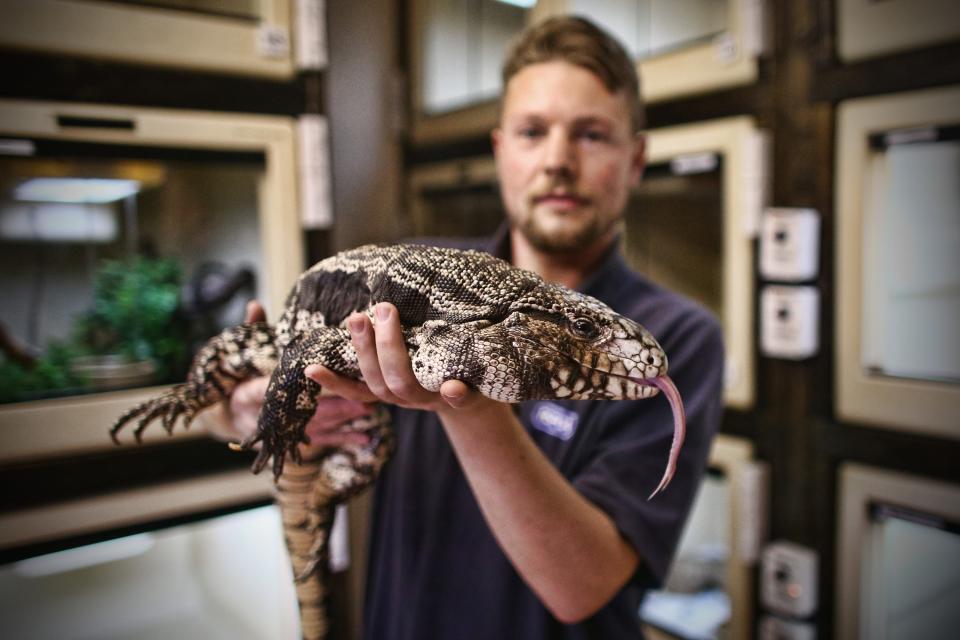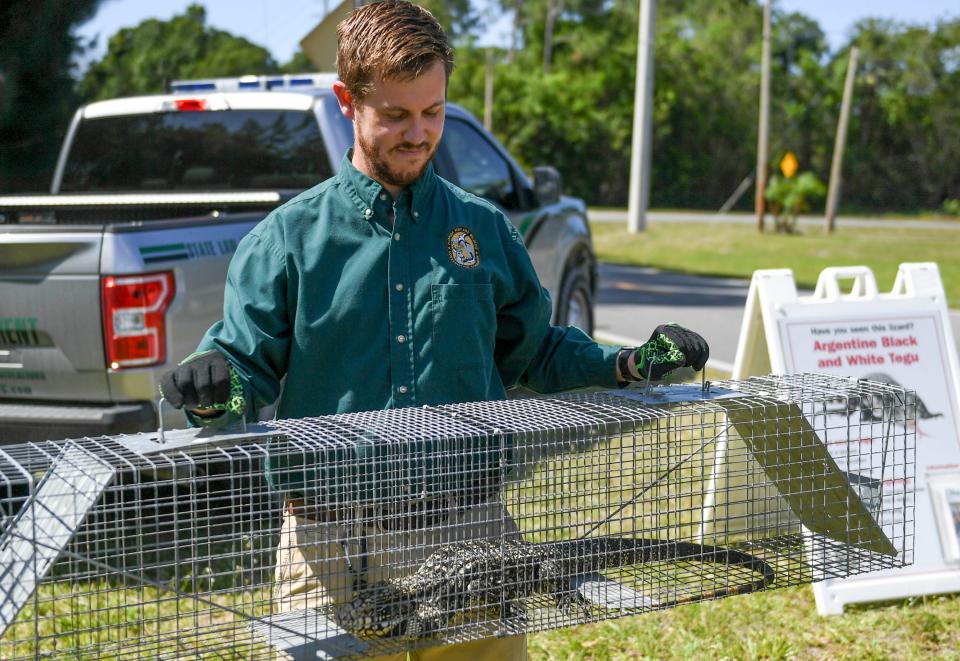South Carolina fears non-native tegu lizards could take root and wreak ecological havoc
Wildlife officials are worried that an invasive lizard species causing problems in at least two neighboring states could now be taking root in South Carolina, with 100 reported sightings in less than four years.
The Argentine black and white tegu, already a problem in Florida and Georgia, has the “potential to be a big issue” if the reptile is able to establish itself in the region, Will Dillman, assistant chief of wildlife for the South Carolina Department of Natural Resources, told USA TODAY on Tuesday.
If they become established in South Carolina, officials worry that the tegu will decimate local animal populations, wreaking havoc on the state's ecosystem.
Dillman and other state officials are trying to stop the species in its tracks, euthanizing any that are captured, spreading awareness of the problem and encouraging residents to report any sightings.
Here's what you need to know.
Why is the tegu such a problem?

Tegus eat a variety of native species like quail, gopher tortoise, insects, mammals, other reptiles, amphibians, birds and eggs of various birds and reptiles, according to the department.
The lizard may also have or spread nonindigenous parasites or pathogens to native wildlife.
The more tegus there are, the bigger the problem.
Since the first documented tegu sighting in South Carolina in August 2020, the South Carolina Department of Natural Resources has gotten 100 reports of the animal in 13 counties, with about two dozen of those confirmed, Dillman said.
The good news is that the department doesn't have any evidence that the tegus have been reproducing.
“We have not found young animals that appear to have originated from the wild to reproduction in the wild," Dillman said. "But we have recovered a number of adult animals that are sexually mature that would be potentially capable of reproducing and that's a concern."
What are the tegu regulations?

South Carolina classified the tegu as restricted, non-native wildlife in May 2021. Current state regulations prohibit tegus from being brought into South Carolina or reproduced, and require pet owners to register the species with the state by September 2021.
Florida, Georgia and Alabama also have established restrictions for the species for its invasive potential.
While there's no evidence that the tegu has become established in South Carolina, "we continue to encourage people who see them or suspect they see them to let us know so that we can try to kind of get them off the landscape," Dillman said.
"We do want people to be aware that they might be out there," he continued, "and certainly if they see one to let us know, so we can make sure that that's not something that happens.
How did the tegu get to South Carolina in the first place?
The likely culprit is the pet trade.
It's likely that the species became a hot commodity because of its “large size, intelligence, docility and hardiness,” according to the South Carolina Department of Natural Resources.
Before the new regulations were put into place in 2021, the species was “commonly bought, sold, traded as pets” in South Carolina, Dillman said.
“We saw them all the time at pet shops, reptile shows and the like,” Dillman said. "We had no real idea of how many were out there on the landscape, but they continued to be brought in as a way to supply the demand of the pet trade."
Since pet owners were required to register and microchip their tegus in 2021, Dillman says they have seen a 100% reduction in the overall trade of black and white tegus in the pet trade.
At the end of the registration period, the department had 93 tegus registered to 54 different people, Dillman said.
'We SHOULD do better': Wildlife officials sound off after Virginia bald eagle shot in wing
Where has the tegu been spotted in South Carolina?
The South American tegu has been spotted in a little over a quarter of the state’s 46 counties recently, popping up in clusters, Dillman said.
The appearance of the lizards near each other tells the department that there have been repeated introductions or releases of the species in to the wild, Dillman said.
"We have seen them kind of pop up in clusters," he said. "So you'll see a couple of animals in a localized area. And anytime that's happening that's where our concern gets raised ... Hopefully they're not coming into contact with each other and reproducing. That's the worst-case scenario."
Here’s a list of the 13 counties where they've been spotted:
Anderson
Beaufort
Berkeley
Darlington
Dorchester
Greenville
Greenwood
Horry
Kershaw
Lexington
Orangeburg
Pickens
Richland
What happens to the tegus that have been caught?
It depends on whether the animal is dead or alive.
The department will humanely euthanize the animal and complete a necropsy, an animal autopsy if the tegu brought in was alive. Dead tegus that brought in are discarded, therefore, not subject to a necropsy.
A necropsy is complete in hopes of learning more about the animal, including its age, sex, food habits and whether or not they were reproductively mature, Dillman said.
'Good girl:' Virginia police dog helps track down missing kid on Christmas morning
What should I do if I encounter a tegu lizard?
The South Carolina Department of Natural Resources recommends anyone who sees a tegu out in the wild to document the sighting by filling out an online form.
In order for a sighting to be officially confirmed, there has to be a picture, location and date, among other requirements.
You can also report the here, via email at herps@dnr.sc.gov, or call a local department of natural resources office in your region, according to reporting by The Herald. Additional guidance will be given based on the information that was received, according to The Herald.
Since tegus are not protected by “state wildlife laws or regulations,” you can get rid of them yourself. You are still required, however, to report the creature to the Department of Natural Resources.
This article originally appeared on USA TODAY: Non-native tegu lizards posing threat to South Carolina wildlife

